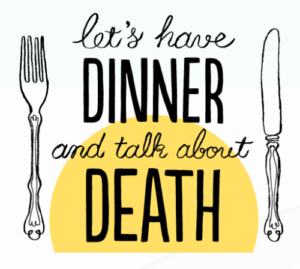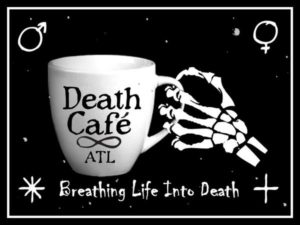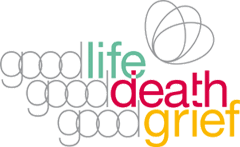Having the Conversation
How to talk to your loved ones about your wishes for end of life.

“How do these geese know when to fly to the sun? who tells them the seasons? How do we, humans, know when it is time to move on? As with the migrant birds, so surely with us, there is a voice within, if only we would listen to it, that tells us so certainly when to go forth into the unknown.”
“It is only when we truly know and understand that we have limited time on earth – and that we have no way of knowing when our time is up, we will then begin to live each day to its fullest, as if it was the only one we had.” — Elisabeth Kubler-Ross
Whether we like it or not, or whether we deny it or not, the world we live in has a 100% mortality rate to date, and we are all going to die. We humans all have that in common. What is different and individual about our deaths are the choices we make around death and dying. Some of us believe that the best course of action is to do nothing and let life’s end take its course, while others want to make some personal choices about how they want their deaths to be when the time comes. Either way, the choices people make about their own deaths are intensely personal choices. How we choose to die is a matter of personal autonomy and individual liberty, and everyone should be able to make those choices without interference from any person or institution.
As a society, we must begin to talk about death as a natural course of our lives, and begin to care for like other major life transitions, such as the birth of a child. Some say that talking about death and allowing people to control the manner and timing of their death creates a death culture. Others believe but that is a fear-based point of view, and that confronting mortality and engaging in meaningful conversations about death and dying increases appreciation for life and energizes people to live in the moment, seize the day, and focus on what they love most.
We have become so focused on how long we can live and how well we can live, that we are afraid to talk about death. It is not talked about in our faith communities, with our friends and neighbors, and not only is it a taboo subject in social circles, it is a forbidden topic of conversation even among family members.
So how do we begin to have such a conversation? By asking ourselves and our loved ones a serious of questions such as:
- How do we want to live at the end of our lives? How well do we want to live, how long do we want to live? What is important to us?
- How do we communicate our end of life wishes to loved ones to ensure that our plans unfold as desired and that our wishes are respected?
- How can we ensure that we can relieve suffering at the end of life while also protecting individual dignity by ensuring that we get the ending we want, not the one that the disease may give us?
- How can we end our life with control and integrity, and by our own hand, rather than be at the mercy of physician’s directives?
Answers to these questions should be up to the individual in consultation with their loved ones and their physicians. Every individual has the right to decide for themselves what the answers to these questions will be, and to determine their own medical treatment.
There is a movement in the US to change from a culture that denies and avoids death to one that embraces it and is not afraid of it. The change begins with our willingness to enter into conversation about it with those we love and trust. One conversation at a time, we can change the way we view death and the way we approach it. We can plan for it, in consultation with loved ones, banishing the taboos and fears around it.
Having the conversation about death and dying and engaging in advance care planning are gifts that you give your loved ones. By informing them of your wishes and instructions, you are alleviating the burden on them of having to make tough decisions when the time comes. They will know in advance what you want because you have talked to them about it, and they will respect your wishes. The conversations and the planning are your essential tools which provide you and your loved ones with peace of mind, and they give you your best chance to create a peaceful and loving environment around your death.
To help you get started, here is some information and links to organizations who have excellent resources to help you begin the work of having this important conversation.
 The Conversation Project: Helping people share their wishes for care through the end of life
The Conversation Project: Helping people share their wishes for care through the end of life
https://theconversationproject.org/
The Conversation Project (TCP), a non-profit organization (NPO), is a public engagement initiative whose goal is to help people talk about their wishes for end of life care so those wishes can be understood and respected. They believe the place for this conversation is not in a hospital ICU unit, but at home with your loved ones.
TCP began in 2010 when Ellen Goodman, Pulitzer Prize winner, together with her colleagues met to share stories of “good deaths” and “hard deaths” in their own circle of loved ones. Out of those informal meetings a grassroots public campaign emerged with the goal of making it easier to spark conversations about living and dying, and to encourage people to have the conversations now, and keep talking as often as necessary throughout the course of their lives.
TCP collaborated with the Institute for Healthcare Improvement (IHI), an NPO that helps lead improvement in health and healthcare throughout the world. TCP is run by Ellen Goodman and IHI staff with support from many expert advisors.
TCP provides excellent on-line resources to help you get started on your conversation and all of their materials are available to download and print for free. We recommend beginning by looking at their Conversation Starter Guide, a 12-page fillable guide that walks you through some basic advance care planning. Then, browse through their website to find other materials that are most helpful to you.
 Death Over Dinner
Death Over Dinner
This organization started with a University of Washington graduate course called “Let’s Have Dinner and Talk About Death,” taught by Michael Hebb and Scott Macklin. The course grew into a website, then into a global project with an Australian edition, a Jewish edition, and the newest evolution, a Doctors and Nurses edition. The first global initiative was launched in 2013 and in a single night there were over 500 dinners in 20 countries. Since then, there have been over a hundred thousand dinners around the globe.
This project presents a simple set of on-line tools to help families and friends have the conversation around death and dying – over a delicious meal. Their premise is that the dinner table is the most forgiving place for difficult conversations, and that it is a more suitable venue for these conversations than the places we usually encounter the need for these discussions.
Their website provides step-by step guidance on how to plan your own dinner, with links to videos and a Ted Talk on Death Over Dinner as well.
 Death Cafés
Death Cafés
We would like to expand our list of active Death Cafes in Georgia, so if you know of any, please send contact info to [email protected].
Atlanta Public Library Death Café
https://www.eventbrite.com/e/death-cafe-tickets-234038123327?aff=erelexpmlt
Atlanta Death Café – Death Pub
[email protected]
The Death Café movement started in Europe with Swiss sociologist, Bernard Crettaz in 2004. He began setting up “Café Mortel” meetings in Switzerland and France where people could come and talk about death. In 2011, Jon Underwood from the UK adopted his own version of Crettaz’s Death Café concept and took the idea mainstream. Since then, hundreds of Death Café meetings have been held in countries ranging from the US to Australia.
Death Café’s purpose is to increase awareness of death with a view to helping people make the most of their (finite) lives. To use the term “Death Café,” event organizers must adhere to certain standards and practices: events must be non-profit, not lead anyone toward any particular conclusion or course of actions, and must be held in an accessible, respectful and confidential space, free of discrimination.
Each Death Café shares these common elements but they are each uniquely styled. They are held in a myriad of different venues, such as actual cafés and restaurants, people’s homes, and local community and cultural centers. The facilitator plans different topics to address and leads the discussion. Also, there is cake! Refreshments are a key component in these gatherings. Participants adhere to a standard of discussion that is understanding and tolerant of different religious and spiritual beliefs. Judgement has no place at the Death Café.
Each gathering has a set of loose guidelines meant to ease the flow of these tough conversations. Some participants have never had the conversation about death and dying before, and some may be professionals who deal with it on a daily basis. Attendees are people of all ages who want to dig deeper into their beliefs about death. Many conversations at the Cafés are about how you would want to die, how you would want your funeral, and what your fears about death and dying. Although the topic of grief may come up in the conversations, the Cafés are not grief support groups. They are about having a conversation that needs to begin, and hopefully taking that conversation with you when you leave into the rest of your life and spreading it to those around you.
Our culture in the US does not often invite the opportunity to explore feelings about this topic, leaving people with the feeling that it is taboo to talk about death. Here in the US, we tuck it away into a neat compartmentalized closet that remains closed throughout our lives, or in some cases, deny death altogether. The Death Café offers an opportunity to talk about it, in an environment of non-judgmental open discussion, and to gently explore feelings and perspectives with friends. Being comfortable with a conversation about death and dying – and having some cake – is what Death Cafés are all about!
 Good Life Good Death Good Grief – Demystifying Death Week
Good Life Good Death Good Grief – Demystifying Death Week
https://www.goodlifedeathgrief.org.uk/content/ddweekevent/
This organization, based in Scotland, designates one week in May each year as Good Death Week, or Demystifying Death Week. It gives people the opportunity to promote the positives of a society where people have a chance to talk about death and dying and bereavement. During the week, groups organize local events, dinners, galas, death cafes, film nights, lunch groups, craft sessions and the like, all aimed at opening the conversation around death and dying. They provide great on-line resources for organizing your own Demystifying Death Week events, and ideas for digital events.